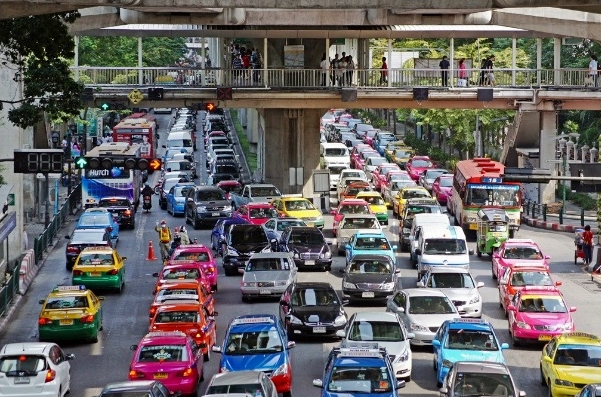
Uber illegal in Thailand, and the Ministry of Transport says drivers driving for Uber will be arrested if caught
Earlier in the month, ride-share company Uber had a meeting with Thailand’s Ministry of Transport in an effort to solve the problem they have been having in their competition against Thailand’s legitimate taxi services.
The meeting, at least in Uber’s eyes, was probably not a success as the Ministry of Transport agreed to do nothing except a ‘six-month study’ to decide whether the law should be changed when it comes to the legality of ridesharing apps in Thailand.
What that meant as far as Thai law is concerned is that Uber illegal in Thailand is now a thing. At least until any decision is made on the study, and that is likely to take up to 12 months to happen.
What that also means is, if you are using Uber in Thailand, until a decision about its future in the Kingdom is made, you are using an illegal form of transportation and, yes, the police have the right to stop an Uber taxi while you are using it and arrest the driver.
But will this stop them from operating in Bangkok, with Uber illegal in Thailand?
Well, considering the company seems to think it is above the law in just about every country it operates it, it is no surprise when Uber Asia’s Amy Kunrojpanya told the Bangkok Post that Uber would continue to operate in Thailand regardless that the Ministry of Transport has told them their drivers will be arrested if they do.
Because Uber’s response to a driver being arrested?
Apparently, they promise to reimburse them for any fines they get as a result of the arrest.
Which basically shows you exactly how much Uber cares about their Thai taxi drivers. Get a police record? Not our problem. We’ll just reimburse your fine.
Now, personally, I detest Uber.
They are a company that are being sued by various competitors for anti-competitive practices (Among other nasty things, Uber employees have called for taxis at rival companies and then just not shown up for the ride — thus, costing the company and the driver lost revenue).
They treat their drivers like garbage, as they are treated as contractors not employees, so do not get the benefits drivers that work for legitimate taxi companies would get under the laws of several countries.
An Uber executive has also suggested the company should run campaigns against journalists that have written stories about their unfair and, in some cases, illegal practices. Even going after one female journalist, Sarah Lacy, to such an extent she worried about her own safety and that of her children.
So, for me, it will be a cold day in hell before I ever use an Uber car. Whether in Thailand or anywhere else.
And if you don’t like supporting companies that think making money for themselves is far more important than abiding by the law, or than keeping their drivers (and their passengers) safe and free from arrest, then I suggest you don’t either.
Besides, there’s nothing wrong with Thailand’s taxi companies.
In fact, I have taken taxis in Bangkok and elsewhere in Thailand almost every day for the entire 14 years I have lived in Thailand, and not once have I ever had a problem other than an occasional surly driver.
In fact, most Thai taxi drivers have gone out of their way to be friendly, helpful and to get me where I need to go in the time I have to get there.
What more could you ask for?
Well, Uber illegal in Thailand and still operating for one.
